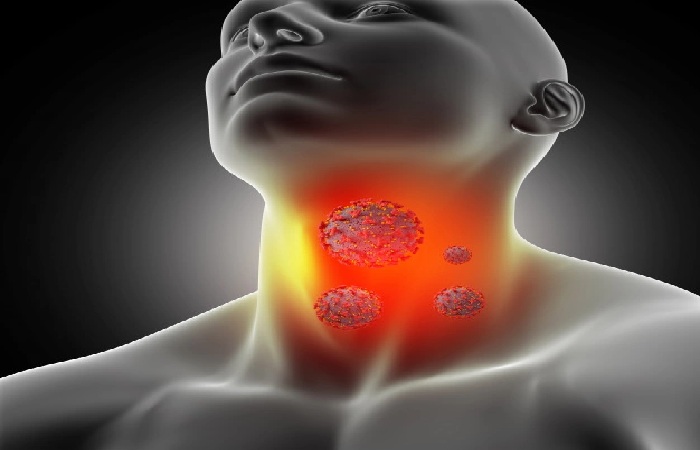Table of Contents
Introduction
Thyroid diseases – The thyroid gland is a small organ create in the front of the neck, wrapped around the trachea (windpipe). It is shaped like a butterfly, short in the middle with two broad wings that extend to the sides of the throat. Thyroid is a gland. You have glands all over your body, where they make and release substances that help your body do specific things. Your thyroid produces hormones that help control many important functions in your body.
When your thyroid isn’t work properly, it can affect your whole body. If your body creates too much thyroid hormone, you can develop a disorder called hyperthyroidism. If your body makes little thyroid hormone, it’s called hypothyroidism. Both conditions are serious and should be treated by your healthcare provider.
Thyroid Gland is Positioned Below the Larynx

It can be responsible for many things: for example, that we feel tired, listless or hungry, have a racing heart and sweat, or gain or lose weight. These symptoms can be caused by the overproduction or underproduction of the thyroid hormones (T3 and T4). The most significant common disease of the thyroid gland is its enlargement. This condition is called goitre. In most cases, this is benign and is caused by an iodine deficiency. However, there are often nodules in the thyroid gland with goitre. A thyroid nodule can also be malignant; one then speaks of thyroid carcinoma. With ultrasound and scintigraphy, it can then be examined what type of node it is.
How is the Thyroid Made up?
The thyroid consists of 2 lobes that resemble a butterfly in shape and are arranged in a crescent shape around the windpipe just below the larynx. The thyroid gland can be palpated during the swallowing process because it moves.
How Does the Thyroid Work?
The thyroid is accountable for creating the hormones triiodothyronine (T3) and thyroxine (T4). The healthy thyroid gland is controlled from the brain by the hypothalamus and the pituitary gland (pituitary gland). Both thyroid hormones can also be produced artificially and then administered in the form of tablets in the case of hypothyroidism. Both T3 and T4 have the same effect on the body: they lead to increased fat loss, improved insulin release and increased energy metabolism. They are also crucial for the growth and maturation of the newborn brain, nervous system and skeleton
For the thyroid gland to produce these two hormones, it depends on the supply of iodine. According to the WHO, a daily intake of 150-300 μg iodine is necessary. The need for iodine is increased during pregnancy since the thyroid hormones are jointly responsible for the excellent development of the child. If iodine is missing, T3 and T4 cannot be produced sufficiently. This can lead to reduced growth and maturation of the child’s brain.
Iodine is also very abundant in marine fish and sea creatures. Table salt is iodized in Austria with 20 mg potassium iodide/kg whole salt.
Adjacent to the thyroid is the parathyroid glands, which are the size of a lentil. Their task is to synthesize parathyroid hormone (PTH), which regulates the calcium concentration in the blood when required.
What Thyroid Diseases are There?
Thyroid disorders include:
hypothyroidism (hypothyroidism)
hyperthyroidism (hyperthyroidism)
thyroid cancer
goitre (goitre),
inflammation.
Goitre: What is it?
Goitre (colloquially goitre) is an enlargement of the thyroid gland (struma diffuse). This is usually accompanied by a nodular remodelling of the tissue (struma nodosa). The most common cause of goitre is years of diet-related iodine deficiency. In addition, specific growth factors lead to an increase in thyroid cells and thus to the rise in the volume of the organ. Rarely, thyroid cysts also cause a visible enlargement of the thyroid gland. A growth or nodular change in the thyroid gland is usually benign. Rarely, thyroid cancer can be the cause. Nevertheless, it is essential to have an enlarged thyroid gland examined by a doctor.
Thyroiditis: what is it?
Inflammation of the thyroid gland (thyroiditis) causes inflammation or damage to the tissue of the thyroid gland. “Thyroiditis” is derived from the technical term for the thyroid gland (Glandula thyroid); the ending “-itis” stands for inflammation. There are different forms of thyroid inflammation.
What Types of Thyroid Inflammation are There?
Acute thyroid inflammation includes “acute purulent thyroiditis” and “subacute thyroiditis de Quervain”. In the critical stage, the thyroid gland can become overactive. These diseases are expressed through touch pain in the thyroid area and flu-like symptoms. They usually heal without any adverse consequences. Only in rare cases can this result in hypofunction. Acute purulent inflammation of the thyroid gland is treated with antibiotics and anti-inflammatory drugs. Surgical measures may be necessary when an abscess by ultrasound or Computed Tomography (CT) is detected.
In most cases of subacute inflammation of the thyroid gland, taking anti-inflammatory drugs is sufficient to control the symptoms. Long-term cortisone therapy is only required in severe cases in addition to anti-inflammatory treatment. This inflammation usually heals completely but can result in an underactive thyroid.
The more common chronic inflammation of the thyroid gland (also Hashimoto’s thyroiditis) is an autoimmune disease in which antibodies in the blood attack thyroid cells. In most cases, it is symptom-free, but it can lead to hypofunction due to the destruction of thyroid tissue.
The so-called fibrosing inflammation of the thyroid (“Riedel goitre”) is very rare. Instead, the thyroid gland becomes larger and hardens for unknown reasons. As a result, the trachea, nerves and blood vessels can be trapped. This makes an operation necessary – with subsequent therapy ( e.g., replacing thyroid hormones).
In rare cases, radiation therapy or an injury can also lead to inflammation of the thyroid gland. Below you will also find information about thyroid inflammation after pregnancy.
Can you Prevent Thyroid Disease?
To some extent, it is possible to prevent thyroid disease. Adequate iodine intake is essential for a healthy thyroid gland. The iodization of table salt used in Austria can – assuming a balanced diet – prevent the occurrence of iodine deficiency (goitre).
Certain pre-existing thyroid disorders (Hashimoto’s thyroiditis, Graves’ disease and autonomy), however, attention must be paid to a restricted iodine intake; otherwise, the course of the disease may worsen. Therefore, special care must be taken when taking iodine-containing drugs and contrast media in this circumstance.

